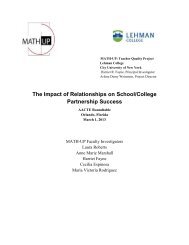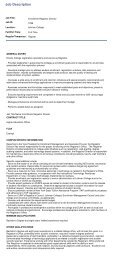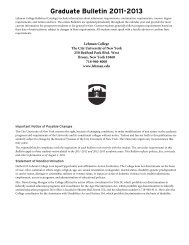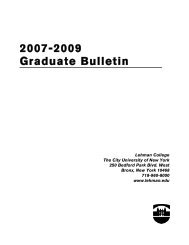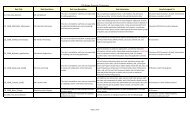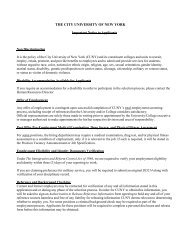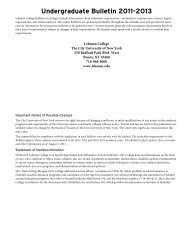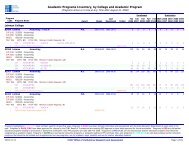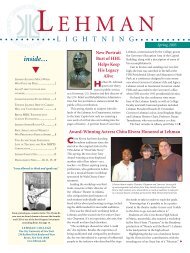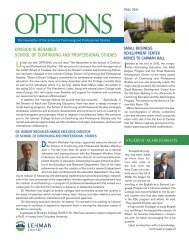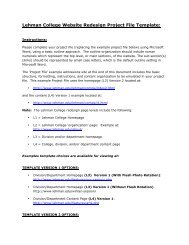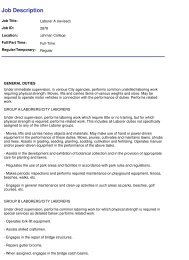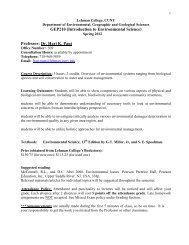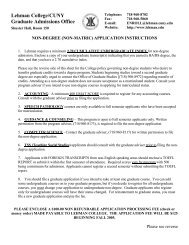Counselor Education 2008 Program Report (PDF) - Lehman ...
Counselor Education 2008 Program Report (PDF) - Lehman ...
Counselor Education 2008 Program Report (PDF) - Lehman ...
Create successful ePaper yourself
Turn your PDF publications into a flip-book with our unique Google optimized e-Paper software.
LEHMAN LEHMAN COLLEGE • THE CITY UNIVERSITY OF NEW YORK<br />
250 Bedford Park Boulevard West • Bronx, N.Y. 10468-1589<br />
GRADUATE PROGRAM IN COUNSELOR EDUCATION<br />
PROGRAM REPORT<br />
Prepared by:<br />
Faith Deveaux, Ph.D.<br />
<strong>Program</strong> Coordinator<br />
<strong>2008</strong>
<strong>Program</strong> Accreditation Status<br />
<strong>Counselor</strong> <strong>Education</strong> <strong>Program</strong> <strong>Report</strong><br />
<strong>Counselor</strong> <strong>Education</strong> <strong>Program</strong> <strong>Report</strong> 2<br />
The Graduate <strong>Program</strong> in <strong>Counselor</strong> <strong>Education</strong> is in the process of seeking accreditation from<br />
CACREP for the Masters degree program in school counseling. After a full review of the selfstudy<br />
materials submitted, the program was approved for an onsite CACREP visit. The team will<br />
be coming to campus in April, <strong>2008</strong>.<br />
Students<br />
• In the Fall 2006 semester, 107 students were matriculated in the program and enrolled in<br />
classes.<br />
• On May 18, 2006, the following students were invited to present poster sessions on their<br />
research and evaluation projects at the LUTE awards ceremony:<br />
Jessica O’Conner<br />
Deborah Ashley<br />
In June, 2006 (8) and January, 2007 (2), 10 students graduated from the program:<br />
Melissa Beatty<br />
Khema Chan<br />
Dozene Fletcher<br />
Judith Galarza<br />
Afsaneh Fartache<br />
Donna Foster<br />
Latica Greer*<br />
Eileen Houlihan*<br />
Norbert Jones*<br />
Minoska Romero<br />
*Members Chi Sigma Iota, Tau Chapter<br />
• On October 21, 2006 a Student Orientation was held in the East Dining Room of the<br />
Music Building. This was well attended and informative. Faculty members who<br />
presented at the event were Prof. Cipriano, Prof. Deveaux and Prof. Fazal.<br />
• In February, 2007, Lisa DeMauro and Arlene Yiadom, two second year students in the<br />
program, were two of 15 national recipients of the Ross Trust Graduate Student<br />
Scholarships, administered by the American Counseling Association. This scholarship<br />
recognizes academic distinction along with a commitment to volunteer service and desire<br />
to work in the K-12 educational environment. They will receive a $1,000. scholarship, a<br />
one-year membership in the American Counseling Association (ACA), and a<br />
complimentary registration for the ACA conference.<br />
• On May 17, 2007, the following students were selected to present poster sessions on their
esearch and evaluation projects at the LUTE awards ceremony:<br />
Lateefah Alston, Jay Corbo, Sam Jarrett<br />
• The following students graduated from the program in June, 2007:<br />
Deborah Ashley*<br />
Elizabeth Butler<br />
Jennifer Digaetano*<br />
Evelia Guzman<br />
Erin Hill*<br />
Jenny Ip<br />
Brian Lombardo<br />
Dorothea McIntosh<br />
Rebecca Mullen*<br />
Jessica O’Conner<br />
Lisa Rhett*<br />
Germaine Ruiz<br />
Jacqueline Thompson<br />
Jahaira Troche*<br />
Keri-Ann Walker<br />
*Members of Chi Sigma Iota, tau chapter<br />
<strong>Counselor</strong> <strong>Education</strong> <strong>Program</strong> <strong>Report</strong> 3<br />
In the Fall 2007 semester, 106 students were matriculated in the program and enrolled in classes.<br />
• On September 29, 2007, a new student orientation was held in the Faculty Dining Room<br />
of the Music Building. Most of the newly matriculated students attended and much<br />
information was distributed and provided. Faculty members who presented at the event<br />
were Profs. Bouknight, Chen-Hayes, Cipriano, Prof. Deveaux.<br />
The following students are expected to graduate in June <strong>2008</strong>:<br />
Ruth Acosta Deborah McEntee*<br />
Marjorie Allen* Yahaira Montes<br />
Lateefah Alston-Kamara* Kimberly Omoloju*<br />
Jinaki Banks Marisa Passafiume*<br />
Jennifer Carchietta Melissa Penley*<br />
Ross Cobin* Stacey Rickman-King*<br />
Jeremiah Corbo Annia Rivero*<br />
Lourdes Diaz* Julissa Rosario*<br />
Melissa Harris Vladimil Ruiz<br />
Samuel Jarrett Francis Solis<br />
Josette Lloyd* Sharese Solomon<br />
Thania Made* Kerri-Ann Wallace*<br />
Diana Matias Adam Yaeger<br />
*Members of Chi Sigma Iota, tau chapter
<strong>Counselor</strong> <strong>Education</strong> <strong>Program</strong> <strong>Report</strong> 4<br />
Curriculum, <strong>Program</strong> Objectives and Course Offerings<br />
There are no curriculum changes to report at this time. The current curriculum is in alignment<br />
with CACREP standards and was approved by the New York State <strong>Education</strong> Department. A<br />
careful review of syllabi is done with every faculty member teaching in the program prior to the<br />
commencement of each semester to assess that program objectives are addressed in course<br />
syllabi. Careful attention to this area is also included as part of the faculty orientation and every<br />
semester faculty members receive a letter from the coordinator indicating the requirement of<br />
complying with program and course objectives. <strong>Program</strong> objectives and curricular offerings are<br />
also standing agenda items for the faculty meetings in the fall and the spring. A course on the<br />
topic of Special <strong>Education</strong> Issues for <strong>Counselor</strong>s has been discussed and is in the planning stages<br />
as an additional course offering. In 2009, the mission statement and the program objectives will<br />
be reviewed by program faculty and presented broadly to department and division faculty,<br />
students, constituencies, including site supervisors and employers, and other interested parties for<br />
feedback. <strong>Program</strong> faculty and administration remain committed to being in compliance with<br />
CACREP standards and to using the standards as a guide.<br />
Faculty Changes<br />
Effective August, 2006, Prof. Robert Eschenauer resigned from <strong>Lehman</strong> College. Effective<br />
September, 2007, Prof. Minaz Fazal assumed a substitute assistant professor in <strong>Counselor</strong><br />
<strong>Education</strong> and, as part of her responsibilities, acted as the Clinical Coordinator of the program<br />
for the academic year 2006-2007. She remained on a substitute line for the year 2007-<strong>2008</strong>,<br />
teaching the research and program evaluation sequence. Her CV is on file in the department<br />
office. After a national search was conducted, a full time faculty member was hired in<br />
September, 2007 for the <strong>Counselor</strong> <strong>Education</strong> program. Her name is Tamisha Bouknight and her<br />
CV is on file in the department office. She is assuming the role of Clinical Coordinator. Another<br />
line was allocated to the program through the CUNY COMPACT III, and after a national search,<br />
Laura Roberts was hired as a new member of the <strong>Counselor</strong> <strong>Education</strong> faculty, effective<br />
September, <strong>2008</strong>. Her CV is on file in the department office. Minaz Fazal, who will no longer<br />
remain on a Substitute line, will continue to teach the Research and <strong>Program</strong> Evaluation<br />
sequence in the program as an adjunct assistant professor. In the Spring, semester 2007, Prof.<br />
Stuart Chen-Hayes was on a fellowship leave as a visiting professor in Taiwan. He returned in<br />
the fall, semester 2007. Additional information about faculty members may be found on the<br />
department faculty page of the <strong>Lehman</strong> website.<br />
Faculty Activities<br />
Following is a sample of some of the scholarly activities of the faculty since the summer of<br />
2006:<br />
Bailey, D. F., Getch, Y. Q., & Chen-Hayes, S. F. (2007, invited). Achievement advocacy<br />
for all students through transformative school counseling programs. In B. T. Erford, (Ed).<br />
Transforming the school counseling profession (2nd ed) (pp. 74-97). Upper Saddle River, NJ:<br />
Pearson Merrill Prentice Hall.
Bouknight, T. (2007) Emerging Leader Nomination by ACES<br />
<strong>Counselor</strong> <strong>Education</strong> <strong>Program</strong> <strong>Report</strong> 5<br />
Pérusse, R., Goodnough, G. E., & Bouknight, T. (2007). <strong>Counselor</strong> education and<br />
educational administration: An exploratory survey of collaboration. Journal of School<br />
Counseling, 5(24),<br />
Colbert, R., Pérusse, R., Ballard, D., and Bouknight, T. (2006). Developing School<br />
<strong>Counselor</strong> Competencies Within a Leadership Role in <strong>Education</strong> Reform. In G.R. Walz, & R.<br />
Yep (Eds.), VISTAS: Perspectives on Counseling 2006. Alexandria, VA: American Counseling<br />
Association and Counseling Outfitters/CAPS Press.<br />
Chen-Hayes, S. (<strong>2008</strong>) Human Rights Award, Association for Multicultural Counseling<br />
and Development.<br />
Chen-Hayes, S. (2007). Leader in the Field, Microtraining and Associates<br />
Holcomb-McCoy, C. & Chen-Hayes, S. F. (2007, invited). Multiculturally<br />
competent school counselors: Affirming diversity through challenging oppression. In B. T.<br />
Erford, (Ed). Transforming the school counseling profession (2nd ed) (pp. 98-120). Upper<br />
Saddle River, NJ: Pearson Merrill Prentice Hall.<br />
Chen-Hayes, S. F. (Spring 2007, invited lecture) "Professional Identity in<br />
<strong>Counselor</strong> <strong>Education</strong>: School and Community Counseling--Personal and<br />
Professional Issues in the USA and Taiwan," in Dr. Ting-Ying Wu's<br />
Professional Identity in Counseling class, National Changhua University of<br />
<strong>Education</strong>, Changhua, Taiwan.<br />
Chen-Hayes, S. F. (Spring 2007, invited lecture) "Transforming K-12 School<br />
<strong>Counselor</strong> Identity, Roles, Skills, and School Counseling <strong>Program</strong>s in Taiwan<br />
and the United States: Systemic Change Models, Developing International Dialogue, and<br />
Creating Action Plans for Equity." National Changhua University of <strong>Education</strong>, Changhua,<br />
Taiwan.<br />
Chen-Hayes, S. F., & Chen-Hayes, L. T. (Spring 2007, invited lecture)<br />
"Unlearning Oppression: Social Justice Equity Awareness, Knowledge, and<br />
Skills for School and College <strong>Counselor</strong>s, Educators, and Administrators."<br />
National Changhua University of <strong>Education</strong>, Changhua, Taiwan.<br />
Chen-Hayes, S. F., & Chen-Hayes, L. T. (Spring 2007, invited lecture)<br />
"Supporting Taiwan's Same-Gender Couples and Families: Developmental Theory,<br />
Narrative Approaches, and Political Action for School and College<br />
<strong>Counselor</strong>s, Educators, and Administrators" National Changhua University of<br />
<strong>Education</strong>, Changhua, Taiwan.<br />
Chen-Hayes, S. F. (Fall 2006, invited lecture) "Bilingual School Counseling <strong>Program</strong>s<br />
using ASCA <strong>Program</strong> Model Audits, School <strong>Report</strong> Cards, and NYC School Comprehensive
<strong>Counselor</strong> <strong>Education</strong> <strong>Program</strong> <strong>Report</strong> 6<br />
<strong>Education</strong>al Plans (CEPs) to Close Achievement, Opportunity, and Attainment Gaps" in Dr.<br />
Ketrin Saud Maxwell's Bilingual School Counseling Internship class, Long Island University-<br />
Brooklyn, Brooklyn, NY.<br />
Chen-Hayes, S. F. (Fall 2006, invited lecture) "Unlearning Oppression:<br />
Awareness, Knowledge and Skills for Bilingual School <strong>Counselor</strong>s as Systemic Change Agents"<br />
in Dr. Ketrin Saud Maxwell's Bilingual School Counseling Internship class, Long Island<br />
University-Brooklyn, Brooklyn, NY.<br />
Deveaux, F. (<strong>2008</strong>). [Review of Family Behavioral Issues in Health and Illness], The Family<br />
Journal: Counseling and Therapy for Couples and Families 16, 185-186.<br />
Deveaux, F. (in press). Teaching and Learning Aesthetic <strong>Education</strong>: Relevance and Reflection: April<br />
24, 2007, Aesthetic <strong>Education</strong>: Expanding Notions of Excellence in K-18 Learning Communities: Queens<br />
College, Queens, NY. (with E. Donas and G. Perry- Ryder)<br />
Deveaux, F. (<strong>2008</strong>). The family life cycle in B. Erford, ed. American Counseling Association<br />
Encyclopedia of Counseling, Alexandria, VA: American Counseling Association (Accepted)<br />
Deveaux, F. (2006). Partnership Celebration, December 7, 2006, Interest Group Facilitator, Division of<br />
<strong>Education</strong>, <strong>Lehman</strong> College.<br />
Deveaux, F. (2006). Teaching for Tolerance. November 7, 2006, Seventh Annual Professional<br />
Development School Conference, Moderator, <strong>Lehman</strong> College, Bronx, NY.<br />
Deveaux, F. (2006). Teachers and counselors together: Let’s get creative. October 12-15, 2006, North<br />
Atlantic Region Association of <strong>Counselor</strong> <strong>Education</strong> and Supervision, Lake George, NY.<br />
Deveaux, F. (2006). Bridging the achievement gap in urban schools: A collaborative approach. June 26-<br />
30, 2006, Cape Cod Institute, American Orthopsychiatric Symposium, Eastham, MA.<br />
Ugoretz, J., Fazal, M., Plaisir, J., Robinson, H., Grasserbauer, D. (2006). E-portfolios in<br />
Teacher <strong>Education</strong>: Same Questions, Different Answers. December 1, 2006, Presented at the<br />
CUNY IT Conference, New York, NY.<br />
Fazal, M. (2006). School <strong>Counselor</strong>’s Role in Supporting Parents and Teachers of<br />
Children with Autism. November 30, 2006. Presented at the <strong>Lehman</strong> Division of <strong>Education</strong><br />
workshop on Autism Spectrum Disorders, with a special focus on Asperger Syndrome and<br />
Implications for Classroom Instruction, Bronx, NY.<br />
Advisory Council<br />
The <strong>Counselor</strong> <strong>Education</strong> <strong>Program</strong> has a wonderful Advisory Council in accordance with<br />
CACREP standards. The Council is comprised of members representing current students,<br />
educational leaders and employers of our graduates, alumni/ae, site supervisors and important<br />
resources to our program in such areas as instructional technology and program evaluation. The<br />
Council has a role in evaluating the curriculum, methods of instruction and program
<strong>Counselor</strong> <strong>Education</strong> <strong>Program</strong> <strong>Report</strong> 7<br />
development. The Advisory Council reviews program materials, student performance and<br />
evaluation data and makes recommendations regarding program development and program<br />
quality. The Advisory Council is able to provide feedback relating to current issues and trends in<br />
the New York City Department of <strong>Education</strong>, the metropolitan New York and surrounding areas<br />
and organizational changes and issues relating to the provision of school counseling services.<br />
Communication with the Council members occurs generally through email and full Council<br />
meetings are held as needed, at least annually. The Spring 2007 meeting was on the same day as<br />
the LUTE Awards Ceremony on May 17, 2007. All Council members were invited to the<br />
celebration and to the induction of the <strong>Counselor</strong> <strong>Education</strong> students into the Tau Chapter of the<br />
Chi Sigma Iota International Counseling and Academic Honor Society.<br />
Professional Development<br />
Throughout the academic year, there are several professional development activities sponsored<br />
by the Division of <strong>Education</strong> that are offered to students, alumni/ae and site supervisors. The<br />
2005-<strong>2008</strong> offerings are listed below.<br />
3/27/<strong>2008</strong> Adolescent Literacy and Hip Hop Culture<br />
Dr. Donna Alverman<br />
11/6/2007 Looking at student work: A Professional Development School (PDS)<br />
Conference<br />
11/29/<strong>2008</strong>: Understanding Tourette Syndrome<br />
Susan Conners, <strong>Education</strong> Specialist for the national Tourette Syndrome<br />
Association, INC. <strong>Education</strong>al materials for on-going professional development in classes were<br />
also provided.<br />
3/28/2007: Teaching Between the Lesson Plans<br />
The guest presenter and performer was Dr. Peter Alsop. Peter is a nationally known singersongwriter,<br />
educator and humorist with a Ph.D. in <strong>Education</strong>al Psychology. He is the Director of<br />
the Harbor Schools Residential Treatment Center for Emotionally Disturbed Adolescents. His<br />
presentations are participatory and entertaining, exploring difficult interpersonal issues. Dr.<br />
Alsop models and discusses practical techniques to help clarify the complicated social<br />
interactions that come up in schools with a focus on social skills development.<br />
12/07/2006 Partnership Celebration: An evening of celebrating our school<br />
partners/supervisors who work with our graduate practicum and internship students. Discussion<br />
topics include counselors and teachers working together collaboratively.<br />
11/30/2006 Autism Spectrum Disorders, with a special focus on Asperger Syndrome and<br />
Implications for Classroom Instruction.<br />
11/07/2006 Teaching for Tolerance: A PDS (Professional Development Schools)<br />
Conference
<strong>Counselor</strong> <strong>Education</strong> <strong>Program</strong> <strong>Report</strong> 8<br />
04/25/06 The Division of <strong>Education</strong> <strong>Program</strong> on Tolerance:<br />
Interdisciplinary Teaching and the "Paperclips" Video<br />
The movie “Paper Clips,” a film about the efforts of one middle school and its surrounding<br />
community in Whitwell, TN, who engage in study about the Holocaust and create a memorial to<br />
the six million people lost in Nazi concentration camps, was shown. This program was<br />
appropriately scheduled for April 25 th , Holocaust Remembrance Day, and the focus of the<br />
discussion following the film was on the kinds of interdisciplinary teaching activities that can be<br />
developed about tolerance and respect for difference.<br />
11/08/05 Supporting Social Emotional Development to Promote Academic Success:<br />
PDS Conference<br />
Keynote Speaker: Dr. Jonathan Cohen<br />
<strong>Program</strong> Evaluation<br />
Sources of program evaluation include the following:<br />
Classroom observation of faculty<br />
Student course evaluations<br />
Annual evaluation of faculty<br />
Alumni/ae follow-up surveys<br />
Site Supervisor/Employer follow-up surveys<br />
Site supervisor evaluation of practicum and internship students<br />
Practicum and intern evaluation of sites<br />
Advisory Council Review and input of constituencies<br />
Division, Department and program faculty meetings<br />
CACREP self-study documents<br />
Classroom evaluation of faculty:<br />
By contract, all adjunct and untenured faculty members are observed by a senior faculty<br />
observation panel member every semester. The observations were all satisfactory. After every<br />
observation, an observation conference is held, the observation is discussed and a memorandum<br />
of the discussion is prepared and signed by both parties. Any areas of recommendation are<br />
presented. These observations are part of a faculty member’s file. The faculty observation form<br />
is on file in the department office.<br />
Student course evaluation:<br />
Students in all classes complete course evaluations every semester for every course. These<br />
evaluations are electronically scored and submitted for tabulation. The results are returned,<br />
indicating the department mean, the faculty mean and the faculty mode score on 10 items.<br />
Students also have an opportunity to write comments. A summary of teaching evaluations are<br />
included in the faculty member’s annual evaluation, and they are invited to review the entire<br />
package at the conclusion of the semester. The course evaluation form is on file in the<br />
department.
Annual evaluation of faculty<br />
<strong>Counselor</strong> <strong>Education</strong> <strong>Program</strong> <strong>Report</strong> 9<br />
Every year faculty members are requested to submit information regarding their scholarship,<br />
teaching and service for the year. The annual evaluation is prepared by the chair of the<br />
department (or designee), includes a teaching evaluation chart, and is reviewed at an annual<br />
evaluation conference with the faculty member. Recommendations are provided and a record of<br />
the conference is made and signed by both parties.<br />
The annual evaluation is part of the record of the faculty member. A copy of the annual faculty<br />
evaluation format is on file in the department office.<br />
Alumni/ae Follow-Up Surveys:<br />
Alumni/ae follow-up surveys are sent to program graduates every January.<br />
The alumni/ae follow-up surveys were sent electronically to 100% of the students who graduated<br />
in June 2006, January 2007 and June 2007. Any students who did not respond were sent the<br />
evaluation via mail with a stamped return envelope. There was a 70% (7/10) response for June<br />
2006 and January 2007 and 41% (7/17) for June 2007 graduates.<br />
FINDINGS:<br />
Based on their program of study, including coursework, fieldwork experiences<br />
and content area courses, following are the results of the survey:<br />
1. In being knowledgeable about the profession of counseling and the specialty of<br />
school counseling, the ethics of practice of the profession and the use of the<br />
ASCA program model: 8 rated “exemplary” and 6 rated “satisfactory”<br />
100% rated either “exemplary” or “satisfactory”.<br />
2. In being knowledgeable about and prepared to assess, plan, deliver and evaluate<br />
individual, group and career counseling services to a K-12 population: 7 rated<br />
“exemplary” and 7 rated “satisfactory”.<br />
100% rated either “exemplary” or “satisfactory”.<br />
3. In being knowledgeable about and prepared to plan, provide and evaluate<br />
developmental lessons plans in a K-12 setting: 11 rated “exemplary” and 2 rated<br />
“satisfactory”<br />
100% rated either “exemplary” or “satisfactory”.<br />
4. In having developed multicultural knowledge, awareness and skills to deliver<br />
professional school counseling services to a diverse K-12 population: 8 rated<br />
“exemplary” and 6 rated “satisfactory”.<br />
100% rated either “exemplary” or “satisfactory”.
<strong>Counselor</strong> <strong>Education</strong> <strong>Program</strong> <strong>Report</strong> 10<br />
5. In being prepared to provide leadership, advocacy, consultation and collaborative<br />
services to a K-12 population: 4 rated “exemplary” and 10 rated “satisfactory”.<br />
100% rated either “exemplary” or “satisfactory”.<br />
6. In being prepared to use research and the uses of technology in needs assessment,<br />
planning and program evaluation in addressing students’ academic, social and<br />
emotional, career and college and developmental needs: 8 rated “exemplary” and<br />
6 rated “satisfactory”.<br />
100% rated either “exemplary” or “satisfactory”.<br />
7. In their field based practice in a K-12 setting under on-site supervision were they<br />
given the opportunity to develop and practice their counseling skills and provide<br />
evidence-based services: 8 rated “exemplary” and 6 rated “satisfactory” and 1<br />
rated “needs some attention”.<br />
93% rated either “exemplary” or “satisfactory”.<br />
8. In being knowledgeable about the relationship between the school counseling<br />
program and the academic and other services in the school, such as the school<br />
based support team, and about the role of multiple intelligences, learning styles<br />
and differentiated instruction in helping students to achieve success: 8 rated<br />
“exemplary” and 6 rated “satisfactory”.<br />
100% rated either “exemplary” or “satisfactory”.<br />
9. In having developed a professional identity as a counselor with a specialty in<br />
school counseling: 9 rated “exemplary” and 5 rated “satisfactory”.<br />
100% rated either “exemplary” or “satisfactory”.<br />
• 100% of the respondents said they would refer someone to the Graduate <strong>Program</strong> in<br />
<strong>Counselor</strong> <strong>Education</strong> that they had just completed.<br />
Following are the responses from the program graduates to the question: What<br />
are you most proud of as you think back on your time as a graduate student<br />
in <strong>Counselor</strong> <strong>Education</strong>?<br />
“I survived the rigor of the program. Despite all the setbacks I was able to<br />
gain the knowledge and insight into the field of counseling and be<br />
equipped for the task/role as a school counselor.”<br />
“<strong>Lehman</strong> College <strong>Counselor</strong> <strong>Education</strong> Master’s <strong>Program</strong> has prepared<br />
me very well in working in K-12 public school system.”<br />
“I am most proud of the high academic standard and detailed information<br />
acquired during my course of study. The class discussions and<br />
interactions were beneficial. I think the most rewarding piece for me, is<br />
my ability to move beyond stereotype and to be more tolerant towards
people whose views and lifestyle differ from mine.”<br />
<strong>Counselor</strong> <strong>Education</strong> <strong>Program</strong> <strong>Report</strong> 11<br />
“I am most proud of the knowledge that I have gained about the ASCA<br />
model. I am in my second year as a school counselor in NYC it is just now<br />
being mentioned at meetings and now it is going to be implemented in the<br />
school system. It makes me proud that I am aware of (and therefore not<br />
fearful) of the change. As a matter of fact I am anxiously awaiting the<br />
change so I can implement more of what the program has taught me. My<br />
knowledge will only help me provide accountability for what I am doing. I<br />
even volunteered to be part of the team that will implement the model in<br />
my region and only did so because I am comfortable that <strong>Lehman</strong><br />
provided me with the knowledge necessary.”<br />
“I think I was proud of being able to do individual and group counseling<br />
and organizing developmental lesson plans for students, teachers and<br />
parents.”<br />
“I am most proud of my knowledge in multicultural counseling. Also, I<br />
learned a lot about the ASCA Model and to close the achievement gap.”<br />
“Actually I am proud to say that I graduated from <strong>Lehman</strong> College with a<br />
Masters in School Counseling. My experience there was great and I<br />
recommend this program to everyone that I meet.”<br />
“I think what I am most proud of is that I was actually able to complete<br />
the program with all of the other responsibilities in my family! Time<br />
management is essential.”<br />
“My scholarship, my ability to master the material and the guidance<br />
development lessons I developed.”<br />
“Although it is very difficult and time consuming, I am most proud of the<br />
website I developed and put on the internet.”<br />
“The binder of CBO’s I put together. I use it almost everyday.”<br />
“Support and encouragement received by staff and students.”<br />
Following are the program graduate responses to the question: What suggestions<br />
can you offer that would help to strengthen the program?<br />
“It would be great if the program can incorporate a class to teach counselors<br />
how to do conflict resolution and peer mediation. <strong>Counselor</strong>s who allow<br />
<strong>Lehman</strong> students to do their internship under their supervision should be given
a free three credit voucher as incentive.”<br />
“I would like to have had more work in working with students with special<br />
needs and also understanding how to work with students with multiple<br />
intelligence and learning styles.”<br />
<strong>Counselor</strong> <strong>Education</strong> <strong>Program</strong> <strong>Report</strong> 12<br />
“There is the need for more communication between the department and<br />
students. Perhaps you could consider a monthly or even semester newsletter<br />
that would provide information on changes or other important event.”<br />
“Just based on what I am doing in my current position, I only have two<br />
suggestions:<br />
1. More in terms of being a designated reporter for abuse/neglect<br />
2. In terms of diverse populations, including special education, looking<br />
at and writing IEP counseling goals.”<br />
“I had difficulty to find sites for internship. I believe the program should have<br />
some agreements with several schools to accept interns on a regular basis.”<br />
“Besides using the ASCA Model as the backbone of the program, the program<br />
should be more conscious of the reality of counseling in our schools. In other<br />
words, the program should incorporate more real life situations that appeal to<br />
the students in the program.”<br />
“Maybe offer some of the required classes that they offer during the summer<br />
to also offer them during the school year. I feel that many students can not get<br />
time off from their jobs during the summer time to get the classes that they<br />
need. It is kind of difficult sometimes for students to try and negotiate with<br />
their employers about taking some time off for their classes. Some employers<br />
give them a difficult time due to this.”<br />
“In addition to coursework and fieldwork the program should incorporate workshops or<br />
presentations from people in the field. More focus on counseling techniques.”<br />
“Make everyone aware of what is needed to be state and city certified. Make certification<br />
questions and process easier”<br />
“I would suggest that there be one more full time professor.”<br />
“I would like to see more fieldtrips and guest speakers brought into the curriculum. In the<br />
Drug/Alcohol class we had a guest speaker who was a recovering addict. I think these<br />
experiences still stand out in my mind.”<br />
These findings, although the N is small, are consistent with the data on the Division of<br />
<strong>Education</strong>’s LUTE survey administered in the spring of 2006. <strong>Counselor</strong> <strong>Education</strong>
students were disaggregated from the unit as a whole and are reported as follows:<br />
<strong>Counselor</strong> <strong>Education</strong> <strong>Program</strong> <strong>Report</strong> 13<br />
Spring 2006 LUTE Summary Data on Professional Knowledge and Skills<br />
of <strong>Counselor</strong> <strong>Education</strong> Candidates<br />
Item Rating (N=28)<br />
My education courses prepared me to….<br />
Be sensitive to learning differences 1.36<br />
Work with parents 1.59<br />
Work with community partners 1.67<br />
Work with school personnel 1.61<br />
My education courses…<br />
Integrated technology 1.93<br />
Overall ed program prepared me to work effectively in urban schools 1.54<br />
1=strongly agree; 2=agree; 3=disagree; 4=strongly disagree<br />
Follow-up based on evaluation data<br />
We are proud of the accomplishments to date in the program, and have integrated students’<br />
feedback into coursework and other aspects of the program. In 2007 in the Assessment class, the<br />
lecture and discussion materials specifically pertaining to special education including the IEP<br />
(the Individualized Treatment Plan), multiple intelligences and diverse learning styles were<br />
added as part of the course. The facilitation of practicum and internship placements has been<br />
addressed with the hiring of a new full time faculty member who has assumed the role of<br />
Clinical Coordinator. We now maintain a book of prospective Practicum and Internship sites.<br />
This resource book includes the site evaluations by the faculty and the contact information of the<br />
site supervisors. The site evaluations of the students are maintained by the Clinical Coordinator<br />
and used as a part of site evaluation. To improve communication with students we post current<br />
information on our bulletin boards and have increased our use of email to deliver news to<br />
students. We have hired one new full time faculty member and another full time faculty member<br />
has been hired to begin in September, <strong>2008</strong>. Both are counselor educators. Regarding informing<br />
students about the certification process, we include information about the credentialing process<br />
in both the Student Handbook and the Practicum and Internship Manual. This information is<br />
also covered in the New Student Orientation, and a web address is posted on the <strong>Counselor</strong><br />
<strong>Education</strong> Bulletin Board. We will continue to compile data and use all our sources of evaluation<br />
to assess our program delivery, objectives and mission.<br />
Site Supervisor/Employer follow up surveys<br />
Site Supervisor/Employer Evaluation forms are sent to supervisors and employers of program<br />
graduates every April.<br />
Site Supervisor/Employer Evaluation forms were sent to a sample electronically. Due to the<br />
limited response, an onsite evaluation form may be delivered when faculty members visit the<br />
schools.
FINDINGS:<br />
The results, reflecting 3 responses, are as follows.<br />
<strong>Counselor</strong> <strong>Education</strong> <strong>Program</strong> <strong>Report</strong> 14<br />
-100% rated the counselor as either exemplary or very satisfactory (1,2) in being knowledgeable<br />
about the profession of counseling and the specialty of school counseling, the ethics of practice<br />
of the profession and the use of the ASCA program model.<br />
-100% rated the counselor as very satisfactory or satisfactory (1, 2) in being knowledgeable<br />
about and prepared to assess, plan, deliver, and evaluate individual, group and career counseling<br />
services to a K-12 population.<br />
-100% rated the counselor as either exemplary, very satisfactory, or satisfactory (1,1,1,) in being<br />
knowledgeable about and prepared to plan, provide and evaluate developmental lesson plans in a<br />
K-12 setting.<br />
-100% rated the counselor as either exemplary or very satisfactory (2,1) as having developed<br />
multicultural knowledge, awareness and skills to deliver professional school counseling services<br />
to a diverse K-12 population.<br />
-100% rated the counselor as very satisfactory (3) in being prepared to provide leadership,<br />
advocacy, consultation, and collaborative services to a K-12 population.<br />
-100% rated the counselor as either exemplary, very satisfactory, or satisfactory (1,1,1) as being<br />
prepared to use research and technology in needs assessment, planning and program evaluation<br />
in addressing students’ academic, social and emotional, career & college and developmental<br />
needs.<br />
-100% rated the counselor as either exemplary or very satisfactory (2,1) in being knowledgeable<br />
about the relationship between the school counseling program and the academic and other<br />
services in the school, such as the school based support team.<br />
-100% rated the counselor as either exemplary or very satisfactory (2,1) in having developed a<br />
professional identity as a counselor with a specialty in school counseling. One respondent added:<br />
“Very much so.”<br />
_100% of those who responded found the <strong>Lehman</strong> College Practicum and Internship Handbook<br />
very satisfactory or satisfactory (1,1).<br />
100% would refer someone to the Graduate <strong>Program</strong> in <strong>Counselor</strong> <strong>Education</strong>.<br />
Here are the responses to the following questions:<br />
Can you suggest any training or supervisory or school counseling related areas in which you<br />
would like to receive professional development from us?<br />
-“I would love to have PD from you. Areas such as identifying and supporting “At
isk” students, so as to minimize the drop-out rate.”<br />
<strong>Counselor</strong> <strong>Education</strong> <strong>Program</strong> <strong>Report</strong> 15<br />
-“We need to put together a comprehensive community-based and school-based<br />
counseling counseling program with the help of in-school counselors and a local agency. I need<br />
my counseling staff to know of such programs, assist with the program design and get clear<br />
about such a program structure. Can you help with this?”<br />
What suggestions can you offer that would help to strengthen the program?<br />
-“The <strong>Lehman</strong> college school counseling program is highly accredited. Currently<br />
there ae two graduates of the program serving on my team, and it is obvious they received the<br />
necessary preparation to embark upon this career. I firmly believe the program surpasses many<br />
counseling programs being offered elsewhere.”<br />
Additional comments:<br />
“Just a bit of self-disclosure, I am a product of the <strong>Lehman</strong> College school counseling program.<br />
With my degree and the wealth of knowledge gained from <strong>Lehman</strong>, I served my current school<br />
with great success for six years as a counselor. After my third year, I decided to pursue a second<br />
masters’ in school administration. The position for Assistant principal became available and I<br />
was asked by my principal to lead in this capacity.<br />
The program at <strong>Lehman</strong> helped to develop a well-rounded person. Due to the training I received<br />
from the school counseling program, pursuing a second masters became extremely easy. My only<br />
petition is <strong>Lehman</strong> continues to carefully screen individuals entering the school program in<br />
order to produce highly trained counselors such as the ones that are currently here with me.”<br />
Site supervisor evaluation of practicum and internship students<br />
It is a program requirement as well as a divisional requirement that any student participating in a<br />
supervised practicum or internship must be evaluated by the onsite supervisor. Practicum<br />
students are evaluated at the conclusion of the field experience. Interns are required to have both<br />
a formative and a summative evaluation by their onsite supervisor. No grades are issued until the<br />
confidential evaluations are received. The evaluations are maintained in the office of the Clinical<br />
Coordinator.<br />
Practicum and intern evaluation of sites<br />
Part of the requirements of participating in practicum and internship is that all students must<br />
complete and submit an evaluation of the site. These are reviewed by the Clinical Coordinator<br />
and when a site appears questionable, the student report is compared with the faculty member’s<br />
evaluation of the site. The program faculty then reassess the site and a subsequent site visit by a<br />
faculty member will be planned to ascertain the suitability of the site or if remedial consultation<br />
is possible.<br />
CACREP self-study documents
<strong>Counselor</strong> <strong>Education</strong> <strong>Program</strong> <strong>Report</strong> 16<br />
A compilation of 8 volumes of self-study materials were submitted to the CACREP office for<br />
review. These materials were submitted to 4 outside reviewers and based on the review, the<br />
<strong>Counselor</strong> <strong>Education</strong> program was approved for an onsite evaluation for CACREP accreditation.<br />
This reflects that the program, with the support of the department, the division and the college,<br />
was able to move to the next level in being assessed for meeting or exceeding the national<br />
standards set by CACREP.<br />
DISTRIBUTION AND USE OF EVALUATION IN PLANNING<br />
The <strong>Counselor</strong> <strong>Education</strong> <strong>Program</strong> <strong>Report</strong> is distributed electronically to the <strong>Counselor</strong><br />
<strong>Education</strong> students in the program, to program and department faculty members, to<br />
administrators, and to the Advisory Board which is comprised of site supervisors, employers,<br />
alumni/ae, educational leaders and experts in the field. The <strong>Program</strong> <strong>Report</strong> is also posted on the<br />
Department webpage. In addition to the data included above, additional feedback is encouraged<br />
and a planning group meets to develop appropriate responses. The evaluation materials are used<br />
for program and course development, resource acquisition, faculty, student and site supervisor<br />
mentoring and professional development.<br />
<strong>Program</strong> faculty, students, alumnae, site supervisors, employers, administrators and interested<br />
and involved parties are viewed as welcome collaborators in program development. In additiono<br />
what was reported above, the new course, EDG 745: Special <strong>Education</strong> Topics for <strong>Counselor</strong>s,<br />
has been developed and will be offered in direct response to input from evaluations of alumnae.<br />
The program coordinator reviews all teaching evaluations and makes appropriate<br />
recommendations as needed. Course content is consistently discussed at regular program and<br />
department faculty meetings. Current student records are reviewed at a minimum of once per<br />
semester and faculty members and advisors confer regarding student progress and the<br />
appropriateness of recommendations and referrals. Transcripts of students are reviewed by the<br />
program coordinator in order to make recommendations regarding an invitation into the Chi<br />
Sigma Iota, tau chapter, of the International Counseling Honor Society. Alumni/ae evaluations<br />
include an assessment of job placements and over 80% of our graduates have been placed in<br />
professional school counseling positions. At least twice each year, our technology and<br />
assessment needs are discussed with appropriate college personnel to ensure that all appropriate<br />
resources for the program can be ordered. As a result of such evaluation our state-of-the-art<br />
counseling lab is being equipped with 3 additional Apple computers, resources related to special<br />
education issues for counselors have been purchased, and additional funds have been requested<br />
and granted for the purchase of assessment software.<br />
WITH APPRECIATION<br />
As we continue to develop as a professional school counseling program, we thank everyone who<br />
has been a part of our growth and who has participated in some way toward our attaining the<br />
highest standards of the profession. We look forward to working with you in the future and to<br />
having a positive impact on the lives of students in our schools through our efforts as
professional counselors.<br />
<strong>Counselor</strong> <strong>Education</strong> <strong>Program</strong> <strong>Report</strong> 17



